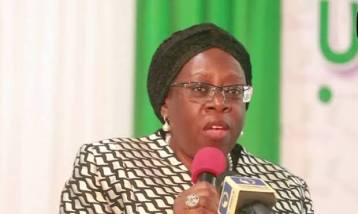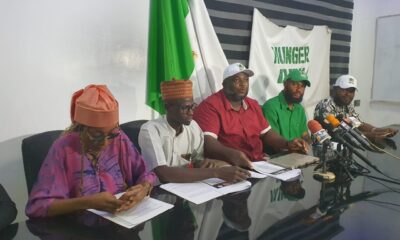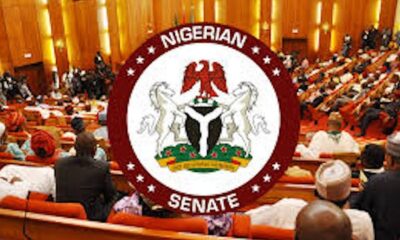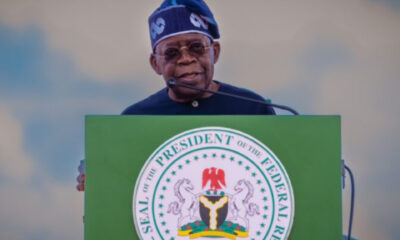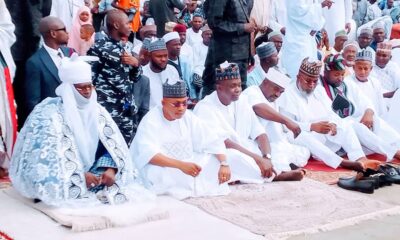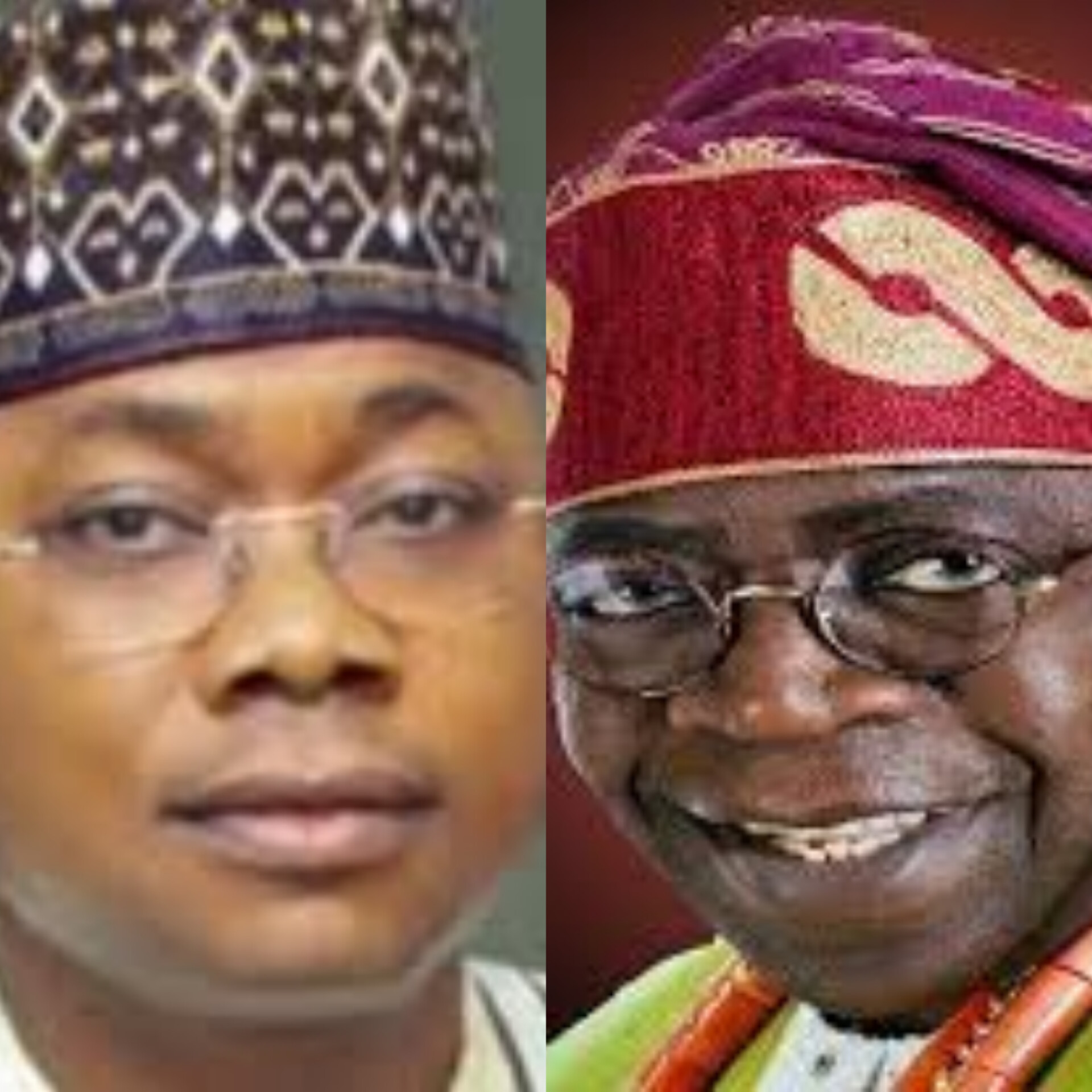Opinion
On Betta Edu and Tunde Irukera
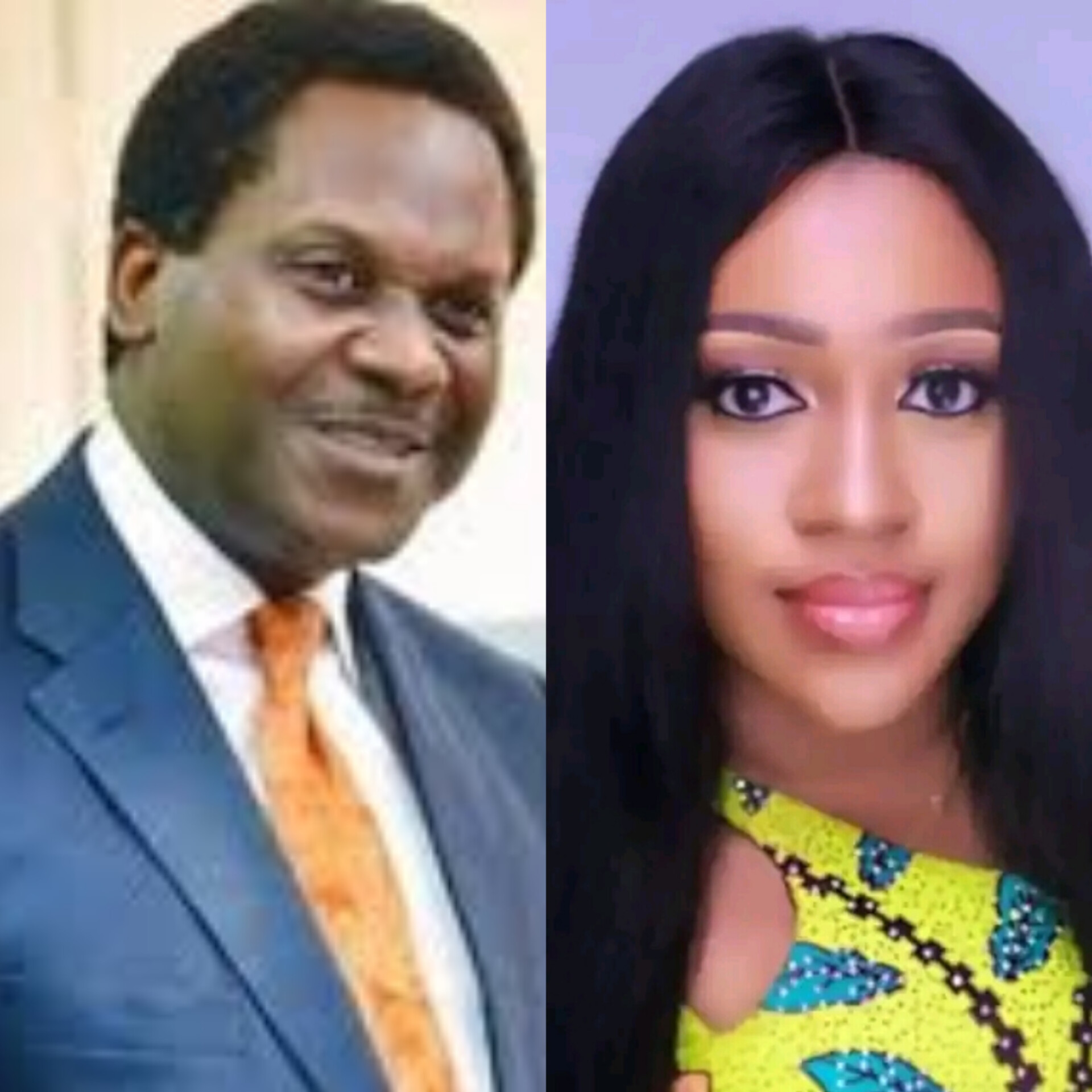
By Tunde Olusunle
Two notable events hallmarked January 8, 2024, the very first Monday post-yuletide this new year. Nigeria’s President, Bola Tinubu suspended Betta Chimaobim Edu, the young medical doctor who hitherto served as Minister for Humanitarian Affairs and Poverty Alleviation. She was fingered in inexcusable financial infractions which ran counter to public service rules and procedures. In the second instance, the President disengaged from office Babatunde Ayokunle Irukera, the urbane attorney and executive vice chairman of the Federal Competition and Consumer Protection Commission, (FCCPC). Alexander Okoh, director-general of the Bureau for Public Enterprises, (BPE), was also relieved of his appointment, same day. In different ways and to differing extents, I know Edu and Irukera, respectively.
I first met Edu late 2018 in Port Harcourt, immediately after the Peoples’ Democratic Party, (PDP) national convention which produced Nigeria’s charismatic former Vice President Atiku Abubakar as presidential flagbearer. The little-known Edu found her way to *Intels Camp,* an idyllic, oasis in the bedlam of the capital of the oil-bearing state, where Atiku’s delegates and political strategists were quartered. An amiable extrovert, she spontaneously cultivated friendships with some of us on that occasion. She desired a role in the presidential campaign, so she clung to us literally, for inclusion as politicking gathered steam ahead of the 2019 elections.
I visited Calabar not too long after. I was detailed on a specific assignment to Cross River State by the headquarters of the PDP. Edu was Special Adviser to Benedict Ayade, the professor governor of the state on Community and Primary Healthcare. She graciously assigned a car to me to move me around in the course of my visit. I had always longed to visit *Tinapa resort,* the baby of Donald Duke the first democratically elected governor of Cross River State, this fourth republic, conceived to recalibrate trade and economic activity in the nation’s South South. That 2018 visit provided a perfect opportunity and inspired a very despondent poem which features in my most recent volume ofpoetry, *A Medley Of Echoes.* Edu was quite helpful.
Edu and I were in touch from time to time thereafter. She excitedly shared video clips of her screening by the senate for confirmation as minister last year. I acknowledged them and wished her every luck. In our previous engagements, she had always expressed preference for a health portfolio, ostensibly because of her professional background. That was the last time I heard from Edu! One will need to interrogate the nexus between people’s previous personas, vis-a-vis the spontaneity of office-induced metamorphosis and heightened hubris. I’ve observed a trend over the years such that further scrutiny has become imperative. Like I always tell those who ask me why I don’t jump upon presumably well entrenched friends when they are in high public office, the point is that I have a “bad habit.” I won’t be found lounging on the corridors or waiting rooms of any friend in public office at whatever level, if we cannot have a telephone conversation and firm up an appointment.
An eminent and adulated public officer like George Akume, former governor, senator, minister and now Secretary to the Government of the Federation, (SGF), returns people’s calls. How about Enyinnaya Abaribe, former deputy governor, high ranking senator and institutional memory of Nigeria’s parliament. Nobody therefore should consider himself too big or important to get back to people, and reach out. The immediate predecessor to John Owan Enoh, the sports minister, used to be my friend, or so I thought. He dragged me to sit with him on the high table at a post-inauguration reception hosted in his honour at the Transcorp Hilton, same day in 2019. His transformation thereafter was such that I never asked for the direction to his office all through his four years as minister! A Yoruba proverb pointedly enjoins us to be intentionally self-respecting so we can be reciprocally adulated.
Irukera and I knew each other by reputation for decades before we finally met. We lived with our parents and siblings in Ilorin the Kwara State capital over time, but never met. He was indeed at the Federal Government College, (FGC), at the same time with one of my siblings at some point, while I was at the University of Ilorin. On one of his visits to Abuja well before his appointment to the headship of the erstwhile Consumer Protection Council, (CPC), he insisted on meeting “this elder brother with whom he shares so many attributes.” We were both born in Kaduna at different times and bear the same name, “Babatunde” which in Yoruba lore presupposes that we are reincarnations of one of grandfathers, paternal or maternal. We are both Yagba from Okunland in Kogi State, and proud alumni of the University of Ilorin. We would further discover that we both got married same day, same month, same year! And so he visited first time and again, ever volunteering to be the one who visits more in deference to his older brother. This was until I insisted on knowing his place, so as to mitigate the “scores” if we were playing a game of football.
Betta Edu is on a yellow card for now relative to the ongoing inquest into her role in a bouquet of financial malfeasance, less than five months in office. While there is a broadsheet of untoward heist perpetrated under her watch, the fact of her approval to the effect that about N600 million be paid into the personal account of one of her proxies is on the front burner. The internet has been throwing up records of Edu’s activities during her stint in office. Her “testimony to answered prayers” at the December 2023 of the mammoth *Shiloh* prayer convention of Bishop David Oyedepo’s Living Faith Church is trending. Edu’s exhibitionist rocking and revelry alongside her “big girl” associates are also in the clouds. The irrepressible, dart-throwing Shehu Sani, former legislator and public engager has indeed applauded Tinubu’s decisiveness in promptly taking out Edu. He doesn’t miss the chance to take a swipe at the president’s predecessor, Muhammadu Buhari, who could only *ashuwa* Nigerians in every instance, never, ever able to act resolutely.
Last December, *Leadership* newspapers one of Nigeria’s respected tabloids named Irukera’s FCCPC “Government Agency of the Year.” The organisation was so recognised for “promoting fairness, regulatory stability and consumer protection within the marketplace.” Irukera was applauded for pursuing “a transformative journey in reshaping and rebranding the CPC, into a proactive and consumer-centric FCCPC.” *Leadership* posited further: “Irukera’s oversight of the commission’s transformation and operationalisation beginning from January 30, 2019,” has been a game-changer. He was credited with his “unwavering dedication to fostering a dynamic and responsive regulatory environment and recorded numerous milestones across diverse sectors including healthcare, digital finance and electricity.” The tabloid noted that “one standout accomplishment is the strategic development and implementation of the “Patient’s Bill of Rights,” among a host of other plaudits.
Irukera hosted a media engagement on the eve of Christmas where he disclosed that the FCCPC had weaned itself off from government funding and was now self-sustaining. According to him, rather than draw from the federal till, the FCCPC indeed remitted N22 Billion to the federation account! Irukera volunteered at that encounter that 90 per cent of the internal revenue generation, (IGR) of FCCPC came by way of enforcement of payment of penalties by defaulting companies. In a milieu where many government funded establishments overdraw their allocations, expend their IGR and go cap-in-hand for supplementation, the FCCPC generated N56 Billion last year out of which N22 Billion was remitted to the federal treasury. Such has been the quantum transmogrification of the FCCPC under Irukera, who inherited an IGR of N154 million in his first year in office in 2017.
There are insinuations to the effect that Irukera has been so treated because of his relationship with former Vice President Yemi Osinbajo, a professor of law and senior advocate of Nigeria, (SAN), who was instrumental to his appointment in 2017. Osinbajo and Irukera were partners in a Lagos-based law firm. Osinbajo contested in the presidential primary of the All Progressives Congress, (APC), in June 2022, which was won by Tinubu. Even before both men met at the ballot at the *Eagle Square,* Abuja, Tinubu never disguised his disaffection towards Osinbajo his own protege, who dared run against him. Osinbajo served as attorney general of Lagos State under Tinubu when the latter was governor from 1999 to 2007. Tinubu also threw Osinbajo up as running mate to Buhari after the APC presidential primary in December 2014.
Irukera is grateful for the opportunity to have served Nigeria’s “incredibly vibrant and loyal consumers.” He is glad to leave behind “a strong institutional advocate in the FCCPC and an outstanding team of soldiers who work there daily for the cause of fair markets.” Irukera offered transparent leadership at the FCCPC, took bold and daring steps, made far-reaching decisions and achieved much in the Commission’s mandate to protect the consuming public from unfair practices. He fearlessly brought to their knees, otherwise powerful local and international companies infringing on consumer rights and made them accountable. Such is the sterling legacy Irukera is leaving in FCCPC, a hitherto little-known government concern.
The period of Betta Edu’s suspension should serve as one to holistically rethink the whole concept of the Humanitarian Affairs and Poverty Alleviation ministry; the National Social Investment Programme Agency, (NSIPA), and their affiliates. Since their emergence under the Buhari administration, they have been fraught with allegations of mindless thievery and mammoth fraud. From Sadiya Umar-Farouk who pioneered the ministry under Buhari; through Halima Shehu the NSIPA chief executive who was recently dismissed by Tinubu and now Betta Edu, the rancid smell of fiscal cannibalism, chokes. Nigeria’s commonwealth to the tune of N88 Billion is alleged to have been fleeced by these three.
Truth is that all the so-called poverty alleviation and empowerment archetypes have only provided for the colossal bleeding of the national wallet. The *tradermoni,* “public works programme” and “conditional cash transfer” among others, have been most dishonest in serving the interest of vulnerable groups. Who authenticates the number of individuals or households provided with tokens for poverty mitigation? The entire poverty tempering superstructure under its various aliases and nomenclature amount to a consolidated scam.
For his inimitable altruism and diligence in service to nation, for opening the eyes of government to the fact that state institutions can be transparently and profitably run, Irukera deserves proper recognition. People who apply themselves to service the way Irukera has should be invited for a handshake and photo opportunity with the President. On such an occasion, Tinubu should ask him to name a particular government department he hopes to help his “renewed hope” agenda. The National Productivity Centre, (NPC), and the Ministry of Special Duties should immediately list Irukera for applicable honours, as different from the Buhari “all comers” epoch.
Tunde Olusunle, PhD, poet, journalist, scholar and author is a Fellow of the Association of Nigerian Authors, (ANA)
Opinion
The Hypocrisy of Power Game Between The North and South: The Time To Talk Is Now
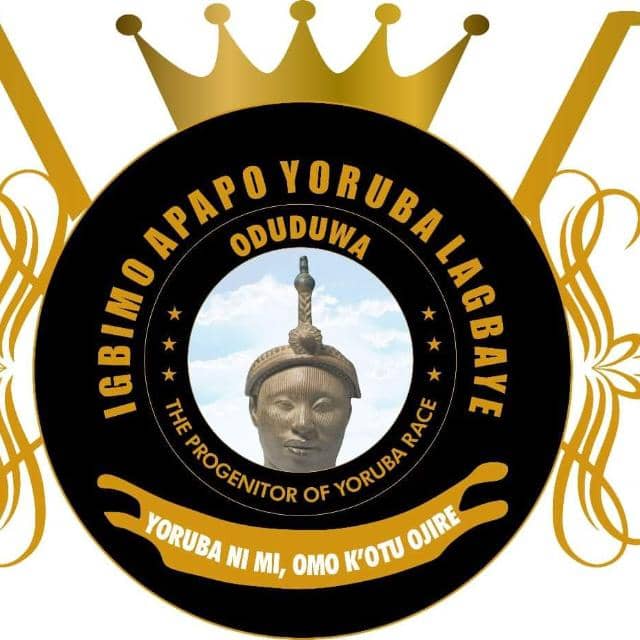
The leadership of the Yoruba Council Worldwide (Igbimo Apapo Yoruba Lagbaye); the apex umbrella body for all Yoruba indigenous people globally is highly concerned about the recent devastating effects of the Northern quests and aggressive desperation for power ahead of 2027 or through any other irrational means before the ripe of time.
We are seriously concerned to witness all manners of unprecedented barrage of fireworks of incendiary rhetoric issued from different Northern elites as emanated from Prof Ango Abdullahi of the Northern Elders Forum seeking to call for an end of Nigeria based on the 100 years expiration of 1914 treaty after 10 years which lapsed in 2014.
To Alhaji Rabiu Musa Kwankanso’s crudity, unverified lies and tale of discords against the South: “Lagos colonising the North”, was his biased statements!
Hence, we must expressly express our dismay and disappointed on such insensitive rhetoric and by that laconically detest such an unflattering statement from chieftain of the New Nigeria Peoples Party (NNPP), Senator Rabiu Musa Kwankwaso, for intentionally misinforming and misleading Nigerians about President Tinubu’s Tax Reform Bills before the National Assembly.
Sadly enough, Alhaji Kwankwaso’s comments while addressing students of Skyline University during their convocation in Kano recently, demonstrated either a lack of understanding of the tax reforms or a deliberate attempt to politicize President Tinubu’s positive visionary and Renewed Hope initiative.
It is evident that Senator Kwankwaso is still grappling with the fallout from his abysmal performance in the 2023 presidential elections. This lingering disappointment seems to have influenced his repeated reliance on divisive rhetoric and unfounded accusations against the administration of President Tinubu.
While the 19 Northern States Emirs and Governors provokingly demanded their Senators and Reps to reject, end and fight the present Administration of President Bola Ahmed Tinubu’s tax reforms bill to a halt, in which one of the arrowheads: Senator Ali Ndume said the “TAX REFORM Bill is Dead on Arrival.”
Rather than engaging in constructive national dialogue or offering meaningful contributions to national development, Kwankwaso, Ali Ndume and other co-travellers appears to have chosen a path aimed at inciting division between the North and the South, and casting aspersions on initiatives being painstakingly designed to benefit all Nigerians.
Such actions are not only unhelpful but also risk undermining the unity and progress of the country at a critical time when inclusive leadership and national cohesion are paramount to stability, progress and prosperity of our dear nation.
President Bola Ahmed Tinubu’s tax reforms are a necessary steps toward addressing the economic challenges facing the country and ensuring equitable development for all Nigerians, including those in the north especially the President’s initiative to tackle the disproportionate distribution of revenues from the Value Added Tax to all 36 states of the Federation and the FCT.
In strongest term we are not oblivion of the ongoing despicable threats bothering on excessive interference and high powered conspiracies to disrupt and hijack power from the South with the systemic and surreptitious renewed onslaught recruitment of the former President Olusegun Obasanjo as one of centrifugal forces being radically committed through his offensive and disparaging statements being deliberately orchid in running the current Administration down by all means possible.
Moreso, as reflective of his self styled selfish act and hatred for Constituted authority, his megalomaniac inclination and inordinate ambitions against President Bola Ahmed Tinubu led government, especially having lost power through his proxy kid Peter Obi via the ballot in 2023 Presidential election.
We hereby warn former President Olusegun Obasanjo to refrain from making statements that is capable of undermining Nigeria’s unity, peace and progress.
While we reiterate and assert our absolute confidence, that the country is functioning effectively under President Bola Tinubu led Federal Government, though with some surmountable challenges, still as they postulated, peace is what matters and not a all manner of provocative statements within the polity, because there will be light at the end of the tunnel, God’s willing.
To set the record straight, hence, it is necessary to respond and react appropriately to Chief Obasanjo’s recent keynote address at the Chinua Achebe Leadership Forum at Yale University in Connecticut, USA.
Wherein in his address, Baba Obasanjo criticised Nigeria’s leadership, describing the country as being a failed state of “state capture” and urging Nigerians to prioritise credible leadership for the Independent National Electoral Commission (INEC) to ensure electoral integrity.
Regrettably, former President Olusegun Obasanjo’s language of the war on peace time is a disaster and unpatriotic move in calling for anarchy, which is quite an anathema to the status of an elder statesman in his referential eldership.
The vituperation of Chief Olusegun Obasanjo’s lecture or better defined as tantrums Talk show, as the Chief harbinger of our worsening state of hunger and hardship was full of energy to condemn the current Administration with utter hatred of his avowed “do or die” mentality that has been infamously reputed to be offensive disappointing and disgusting as the only salvo that can be fired from a despotic and totalitarian personality only found to be hypocritically and deceitfully projected himself as a true democrat.
It was in record how he levelled the land of Odi with deadly precision and mortality even without any Justice till date, he removed Dariye and Fayose through illegitimate means of declaration of state of emergency all because he lacked the receptive mind for criticism and tolerance.
Now we must reiterate and state emphatically in admonishing the Northern elites to think twice on their incendiary staments and spiral bombardment of attacks through sponsored protests, media adverts or careless statements as well as the links such as: the #EndBadGovernance which started by some Northern youths, that was latter aggravated further and taken over by the #DayofRage led by thier proxies.
Unfortunately, this furtive and clandestine motivated underwater currents are largely engendered and orchestrated towards a obvious suspected Northern quest and desperation for power by all means ahead of 2027 Presidential elections.
How do we rate a situation wherein throughout the 8 years tenure of the former President Muhammadu Buhari, the entire Northern elites do not consider ending Nigeria treaty of 1914 only to wake up at the 99th hour of a Southwest Presidency to rage all manners of brimstone?
Hence, we warn in strongest term that this premeditated plan and well marshalled evil agendas to cause disunity, mayhem and strive among the citizens must be stopped once and for all for the betterment of our dear nation.
We vehemently frowned at the spurious and unverified lies, especially devastating propaganda actions targeted at the minds of their Northern kinsmen and women to hate and wish the President dead, this we unequivocally resist and condemned in its entirety.
This hypocrisy must stop now, wherein we lost lots of our brave minds to unbearable brazing manipulations and desperation in the past; Chief Obafemi Awolowo and MKO Abiola are proven records of similar antecedents of Northern hypocrisy and Power mongering.
It is hightime we talk truth to ourselves at a National Confab after each regional dialogue on the way forward, for if the North continuously hold the cliché of the “North are born to rule” ideology at the expense of the South, that means the rest of us are meant to be treated as their “slaves”, that are not safe in this country.
Have we for ones queried why the Northern Nigeria has more political advantages compared to their Southern counterparts: More state Governors and State House of Assembly members and Speakers, local government Chairmen and counsellors, Senators and House of Representatives members and more Federal institutions and employment opportunities and placements to mention a few.
This was why the Northern elites are eager to shut the tax reform bill down through their Northern Senators if the bill is brought for deliberation without having a concise dialogue with the rest of us.
If the Southern tax regime money is good to construct good roads and railway line to Maradi Republic of Niger, why now that the tax reform which is the best for the country is being campaigned against brutally, using legitimate means to commit illegality.
It is high time we are all captured into the ongoing comprehensive tax system, wherein both the citizens in the Northern and Southern parts are taxed eqaully , while the need to undermine this great efforts of President Bola Ahmed Tinubu is highly condemned.
We are bold to say that the need and quests for power must be done with absolute decorum and human face.
2027 election should not end in Ethnic wars and civil strives, we can discuss No Holdbar on all issues of our Nationality without hurting ourselves.
In conclusion, we would not tolerate any capture of Power through coup or any other means of manipulations, or whatsoever in causing instability.
We use this medium to commiserate with the families of the late Chief of Army Staff, Lt. General Taoreed Lagbaja, while as a matter of necessity we call for a detailed investigation into his cause of death and other surrounding circumstances, which calls for concern having witnessed recent threats of coup.
We implore President Bola Ahmed Tinubu to remain steadfastly committed and focused on ensuring good governance to the greatest benefits of greatest numbers.
We have emphatically and unapologetically spoken!
Signed:
Prince Isaac Aderemi Ajibola,National Publicity Secretary, Yoruba Council Worldwide.
Opinion
Day Mamman Vatsa welcomed Ken Saro-Wiwa to his Abuja Village

By Tunde Olusunle
He reincarnated in the form of a cream coloured, two-storey building in the bosom of the boulder-braided, writers’ commune, in the rocky delight of Abuja’s Mpape district. His happy host, like him an erstwhile member of the tribe of wordmongers was despatched over a phantom putsch one decade before him. But he rolled out a carpet of dry laterite with the steady onset of northerly harmattan, to receive his new guest and kindred spirit. The air was sedate, the biosphere alluring and serene as his name echoed from the signage hoisted in front of the structure. This, henceforth, will be the haven of scribblers from across the globe desiring genuine solitude to commune with their muses in the very intricate venture of creative expression. Not too many of the young writers who enthusiastically witnessed the recent commissioning of the *Ken Saro-Wiwa International Writers Residency* in Abuja, however, knew enough about the martyr who was so canonised, nor the nexus between Ken Saro-Wiwa and his figurative “host,” Mamman Jiya Vatsa.
As part of the activities commemorating the 43rd International Convention of the Association of Nigerian Authors, (ANA), which held between Thursday October 31 and Saturday November 2, 2024, a newly built edifice christened after Saro-Wiwa, was scheduled for inauguration. Ken Saro-Wiwa remains one of Nigeria’s most multitasking and most productive writers of all time. He lived for only 54 years but left behind an authorial legacy which continues to challenge the prolificity of successor writers. Saro-Wiwa was a compelling novelist, an engaging essayist, a consummate poet, an arresting dramatist, and a fearless public scholar.
Regarded as Africa’s very first purpose-built writers village, the expansive hilltop project in Mpape, Abuja, was named after Vatsa, an army General who was a Minister of the Federal Capital Territory, (FCT), under the regime of Ibrahim Badamasi Babangida. Less than seven months into the Babangida milieu in March 5, 1986, Vatsa was executed by firing squad for alleged “treason associated with an abortive coup.” He was 45 at the time. I had the privilege of meeting Vatsa’s only surviving biological child, Aisha, at the “World Poetry Day 2024,” hosted in honour of her father in March 2024, at the same writers’ village. Vatsa was a writer who reportedly published about 20 anthologies of poetry. These include: *Verses for Nigerian State Capitals,* (1972); *Back Again at Wargate,* (1982); *Reach for the Skies,* (1984), and *Tori for Geti Bow leg and other Pidgin Poems,* (1985).
The renowned literary scholar, critic, polemicist and Emeritus Professor, Biodun Jeyifo, was perhaps the first notable intellectual to engage authoritatively with Vatsa’s works in the primordial *Guardian Literary Series, (GLS),* published by *The Guardian* newspapers of old, in the 1980s. The essay is published in *Perspectives on Nigerian Literature, (Volume 2, 1988),* edited by Yemi Ogunbiyi. Vatsa as FCT helmsman, it was, who allocated the generous swathes of hitherto pristine land with scenic views upon which the writers village is sited today. The complex is deservedly named after him in eternal gratitude by the writers fraternity.
Ken Saro-Wiwa was the fourth President of ANA. He succeeded the renowned dramatist and Emeritus Professor of theatre arts, Femi Osofisan, in 1990, and was a very energetic personality, famous for the tobacco pipe which was permanently seated on his lip, drawing parity with that of Ousmane Sembene, the famous Senegalese frontline African novelist and filmmaker. Saro-Wiwa had a multitasking career which saw him as a university lecturer in his earlier years; an administrator and public servant, and an environmental activist, at various times. He was leader of the *Movement for the Survival of the Ogoni People,* (MOSOP), which prosecuted a nonviolent campaign for the protection of Ogoni land and water resources from devastation by oil multinationals.
He backed up this enterprise with regular interventions in the public space as a writer and columnist for a number of authoritative newspapers. He consistently drew attention to the despoliation of the natural resources of his people and wrote regularly for *Vanguard* and *Sunday Times,* among other publications. He was a regular, long-staying guest of the gulags of successive military governments, through the administrations of Ibrahim Babangida and Sani Abacha. In 1994, he was arrested and charged with instigating the murders of four Ogoni leaders, May 4, 1994, on a day he was indeed barred from accessing Ogoniland. Saro-Wiwa and his eight “accomplices” were executed by hanging at the Port Harcourt prison where they were held and convicted, on November 10, 1995, exactly one month after his 54th birthday on October 10, 1995.
By some uncanny calendrical coincidence, the *Ken Saro-Wiwa International Writers Residency,* was inaugurated early November 2024, the very same month he was despatched 29 years ago in 1995. Global outrage trailed the killing of Saro-Wiwa and his compatriots, with the Commonwealth suspending Nigeria for three years, among other sanctions. The death of Sani Abacha in June 1998, the subsequent acceleration of processes which returned Nigeria to civilian rule by Abacha’s successor, Abdulsalami Abubakar, and the enthronement of the Fourth Republic in 1999, gradually tempered the world’s coldness towards Nigeria.
At least three dozen book titles are credited to Ken Saro-Wiwa’s name. These include novels, novellas, anthologies of poetry, plays for radio and television, memoirs and diaries, and so on. His works have received some international attention and have been translated into German, Dutch and French. His authorial oeuvre includes: *Tambari,* (a novel, 1973); *Tambari in Dukana,* (a sequel to *Tambari,* 1986); *A Bride for Mr B,* (a novella, 1983), and *Songs in a Time of War,* (poetry, 1985). Ken Saro-Wiwa also wrote *Sozaboy: A Novel in Rotten English,* (1985); *A Forest of Flowers,* (1986, short stories); *Prisoners of Jebs,* (a novel, 1988) and *Pita Dumbrok’s Prison,* (1991), which like the former is very biting political satire.
*On a Darkling Plain: An Account of the Nigerian Civil War,* (memoirs, 1989), a war which he witnessed firsthand, is also one of his very gripping works of prose. Saro-Wiwa’s public engagements are aggregated in several volumes of essays notably *Nigeria: The Brink of Disaster,* (1991); *Similia: Essays on Anomic Nigeria,* (1991) and *Genocide in Nigeria: The Ogoni Tragedy,* (1992). Even in his final days, weeks and months of his sojourn on this side of the divide, Saro-Wiwa “remained incredibly productive.” Posthumously, his family, foreign concerns and nongovernmental organisations continued to call-up manuscripts from his personal library to publish new works by him. A personal diary he kept while he was in incarceration before his eventual annihilation was published with the title *A Month and a Day: A Detention Diary,* in 1995. Over 20 years after his demise, some of his essays were assembled as *Silence would be Treason: Last Writings of Ken Saro-Wiwa,* and published by Daraja Press in Ottawa, Canada, in 2018.
The *Ken Saro-Wiwa International Writers Residency* is one of the first major physical projects delivered by the leadership of Usman Oladipo Akanbi. Fortuitously, Akanbi’s deputy, Obari Gomba, winner of the 2023 *NLNG Prize for Drama,* is from Saro-Wiwa’s Ogoni country. He must have felt gratified by the honour done his *countryman,* whose trajectory he followed as a much younger writer. The eventual breaking of the ice, the decisive commencement of the physical development of the hitherto forlorn and controversial expansive hectarage of ANA property was consummated under the leadership of Denja Abdullahi in 2017. Obi Asika, Director-General of the National Council for Arts and Culture, (NCAC), commissioned the *Ken Saro-Wiwa International Writers Residency.*
The ceremony was witnessed by an impressive array of writers, headlined by Emeritus Professors Osofisan and Olu Obafemi, both former Presidents of ANA, as well as Nuhu Yaqub, OFR. Yaqub holds the distinction of being the only Nigerian scholar thus far to have served as Vice Chancellor in two federal universities, those of Abuja and Sokoto. Other literary greats at the event and the main Convention included: Professors Shamshudeen Amali, OFR, former Vice Chancellor, University of Ilorin; Akachi Adimora-Ezeigbo; May Ifeoma Nwoye and Sunnie Ododo, all Fellows of the Nigerian Academy of Letters, (FNAL) and the Association of Nigerian Authors, (FANA).
There were also Professors Joe Ushie, a Member of ANA Board of Trustees; Emeka Aniagolu; Udenta Udenta; Maria Ajima; Al Bishak; Mabel Evwierhoma; Razinat Mohammed; Vicky Sylvester Molemodile and Mahfouz Adedimeji. Immediate past ANA President, Camillus Ukah, Emeritus diplomat and writer Ambassador Albert Omotayo, featured at the Convention. Canada-based writer, scholar and Professor, Nduka Otiono who served as General Secretary of the association under the leadership of Olu Obafemi, was admitted into the College of Fellows of the body. Chairman of the *Abuja Chapter of ANA,* Arc Chukwudi Eze, was the resident host with compelling responsibility to stay through all events.
Tunde Olusunle, PhD, Fellow of Association of Nigerian Authors, (FANA), teaches Creative Writing at the University of Abuja
Opinion
That ‘fake’ Sanwo-Olu vs EFCC suit: Whodunit? Who sponsored it?

By Ehichioya Ezomon
Strange things happen in Nigeria, one of the latest being a suit purportedly filed by Lagos State Governor Babajide Sanwo-Olu, to prevent the Economic and Financial Crimes Commission (EFCC) from investigating, arresting, detaining or prosecuting him or his aides after his eight-year tenure of office in 2027.
However, the Lagos Attorney General and Commissioner for Justice, Lawal Pedro (SAN), has debunked the widely-publicised suit, saying Sanwo-Olu neither sued nor authorised any legal practitioner to file a suit on his behalf concerning the matter, adding that the EFCC isn’t investigating the governor and hasn’t invited him or threatened to arrest any of his staff, domestic or otherwise.
The odder and curiouser angle to the alleged pre-emptive writ at the Federal High Court in Abuja is that it’s filed in June 2024, almost three years ahead of Sanwo-Olu’s terminal governance of Nigeria’s commercial capital, the richest State in the Federation, and the fifth largest economy in Africa as of 2022 GDP figures, which Sanwo-Olu’s pledged to advance further by 2027.
Thus, the suit is a new one on Nigerians, as the proverbial bridge is way too far off – 36 months to Sanwo-Olu’s end of tenure – to attempt to cross before getting there! Snapets from EFCC’s moves against outgoing governors are telegraphed a few months or weeks before they bow out of office, so giving them the jitters. They either begin to express being squeaky clean, alleging political witch-hunt or daring the EFCC to carry out its threat to make them account for their stewardship.
Since democracy returned in Nigeria in 1999, a few ex-governors have escaped overseas and were forced to return to Nigeria to face prosecution; many have remained in the country to face the EFFC and years of legal ordeal; a couple of them, such as former Ekiti State Governors Ayo Fayose and Kayode Fayemi, have presented themselves to the commission for interrogation and/or prosecution.
Some former governors have engaged in a hide-and-seek, for instance, Yahaya Bello of Kogi State, who’d gone underground for months only to unexpectedly show up at the EFCC headquarters in Abuja in October 2024, and yet wasn’t booked, interrogated, or detained having been on the wanted list of the EFCC and the courts; two have been tried, jailed and served their sentences; one was tried and jailed but his sentence overturned on appeal and was released from prison; while one was tried overseas and served his sentence before returning to the country.
Lately, the EFCC threat to investigate, arrest, detain or prosecute former governors has become mostly academic, and the norm rather than the exception. It appears some ex-governors now relish being dragged by the EFCC, at least, as a way to keeping themselves in the news after missing the years of free spotlighting.
But even as Sanwo-Olu’s reported counsel, Darlington Ozurumba, sues the EFCC as sole defendant over the said threat to arrest, detain and prosecute the governor after his tenure, the EFCC has denied knowledge, contemplation or plans by the commission or any of its officers to harass, intimidate, arrest or prosecute Sanwo-Olu after May 29, 2027,
As reported by The News Agency of Nigeria (NAN), when the matter was called for mention on October 29, Ozurumba informed the court that he’d withdrawn the earlier originating summons, and that the EFCC had been duly served with the latest court documents, which the commission’s counsel, Hadiza Afegbua, said she’s yet to sight, even as the proof of service of the processes wasn’t in the court file, and Justice Abdulmalik adjourned the matter to November 26 for further mention.
In an originating summons, marked: FHC/ABJ/CS/773/2024, dated and filed on June 6, Sanwo-Olu, reportedly raising seven questions and seeking 11 reliefs, prays for a declaration that, under and by virtue of the provisions of Section 37 of the amended 1999 Constitution, “the plaintiff, as a citizen of Nigeria, is entitled to right to private and family life as a minimum guarantee encapsulated under the Constitution, before, during and after occupation of public office created by the Constitution.”
Besides craving a declaration that, upon community reading of the provisions of Sections 35(1) & (4) and 41(1) of the Constitution, the threat of his investigation, arrest and detention by the EFCC during his tenure of office as governor is illegal, Sanwo-Olu allegedly prays the court to declare that the incessant harassment, threat of arrest and detention against him upon the EFCC’s instigation by his political adversaries based on false and politically-motivated allegation of corruption, is a misuse of executive powers and abuse of public office.
Hence, he purportedly seeks, among others, an order restraining the EFCC from harassing, intimidating, arresting, detaining, or prosecuting him in connection with his tenure as the governor of Lagos State.
However, the EFCC, describing as speculative and a conjecture the alleged Sanwo-Olu’s claims and reliefs in his fundamental right enforcement suit, has denied it threatened, invited or took any step at all to encroach on the governor’s right to freedom of movement or violated his right to private and family life and personal liberty.
Countering the originating summons Ozurumba purportedly filed on behalf of Sanwo-Olu, the EFCC, in an affidavit filed on October 31 by its lawyer, Hadiza Afegbua, the deponent, Ufuoma Ezire, told Justice Joyce Abdulmalik of the Federal High Court, Abuja, that the plaintiff’s depositions in Paragraphs 4, 5, 6, 7 and even 8 are unfounded, untrue and unknown to the defendant, and calculated to mislead the court, and are hereby denied.
Noting that the EFCC isn’t investigating Sanwo-Olu, and has never invited him or threatened to arrest any member of his staff, domestic or otherwise, Ezire states that the EFCC invites members of the public for interview, interrogation or any engagement vide a written invitation, phone calls or text messages by any of its officers, who shall introduce themselves by name, rank, designation, and section to enable the invitee trace the officer easily.
Ezire says the EFCC is unaware of any threat to arrest Sanwo-Olu’s “aides, accusation of maladministration or diversion of Lagos State’s funds nor is it aware of any likelihood of a breach of the applicant’s right to liberty or right to own movable and immovable properties in this case.”
Stressing that there’s no petition or any intel gathered before the EFCC to warrant its officers to invite, or threaten to arrest the plaintiff at the moment, Ezire asserts that the entirety of the alleged Sanwo-Olu’s dispositions isn’t true, as the application is “misconceived and brought in bad faith to mislead this honourable court,” adding that, “it will be in the interest of justice to refuse the reliefs sought by the plaintiff.”
Similarly, Mr Pedro, the Lagos Attorney General, in a statement on October 29 rebutting “the news circulating in a section of the media, titled: ‘Sanwo-Olu sues EFCC over alleged plan to arrest, prosecute him after tenure,’” clarified as follows:
“Mr Babajide Sanwo-Olu, at no time, sued or briefed any legal practitioner to file a suit on his behalf concerning the above subject matter. Moreover, it is implausible for the Governor, who enjoys immunity as conferred by the Constitution, and has almost three years remaining in office, to engage any lawyer on this matter.
“To the best of my knowledge, my inquiry confirmed that the EFCC is not investigating the governor and has never invited him or threatened the arrest of any member of his staff, domestic or otherwise. We are currently investigating how the case came to be without our knowledge.
“For the avoidance of doubt, Mr Babajide Sanwo-Olu has demonstrated exemplary service delivery and prudent, judicious management of public resources. Therefore, Mr Babajide Sanwo-Olu, who is tirelessly working to improve the living conditions of all Lagosians, has no cause for concern when he eventually leaves office at the end of his tenure in May 2027.
“We, therefore, urge media organisations to be cautious about the reports they publish on their esteemed platforms to avoid misleading the public.”
Needless to ask: Whodunit? Who sponsored it? Without a doubt, the so-called Sanwo-Olu’s suit, filed by an “unauthorised legal practitioner,” against the EFCC is the handiwork of his political adversaries trying to induce, instigate or coerce the anti-graft agency to embark on a fishing expedition it’s no reasonable grounds for, either from a petition(s) or intel that points to a likelihood of (mis)appropriation of funds and resources of Lagos by the governor or his aides.
That said, many will defend Governor Sanwo-Olu for perceptively seen as deploying the resources at his disposal to upgrade and develop existing and new infrastructural and human capital needs to match the Lagos motto of “The State Of Excellence” and its Mega City status that’s attracted unprecedented public and private investments.
These include the Lagos Metropolitan Area Transport Authority (LAMATA-) managed ground-breaking Blue and Red Rail Lines, the Bus Rapid Transport (BRT) system, the proposed Fourth Mainland Bridge, the Atlantic City project, the fully-automated Imota Rice Mill, and the Lekki Free Trade Zone that houses the multibillion dollar 650,000bpd-capacity Dangote Petroleum Refinery – the largest single-train refinery in the world at full capacity – which’s Nigeria’s window to self-sufficiency in production and supply of petroleum products.
Other areas in the Lagos socio-economic sphere: Education, ICT, innovation and technology, healthcare, commerce, agribusiness, small-scale industries, entertainment, showbusiness, tourism, and youth and sports development are receiving adequate attention, and have become a source of pride to Lagosians, and emulation by other States in Nigeria.
Lagos, a hub of international engagements all-year-round, has moved up the ladder as one of the most preferred destinations on the continent of Africa, and is up-scaling on the global leisure spots, thanks to Governor Sanwo-Olu and his vastly young, professional, dynamic and dedicated team, who’ve deployed their expertise in various fields to achieve a shared dream of Lagos leading or being among the best in all human endeavours.
Sanwo-Olu isn’t just a workaholic delivering on the promises of his administration, but he’s the epitome of the alias, “Mr Project,” in the true sense of the lingo in our clime. So, why should he be worried about the EFFC when he’s deploying the resources of Lagos to develop the state to an enviable standard! The “amiable” governor should free his mind and continue “to finish strong” with the good works he’s been doing, for which he’s received umblemished praises, accolades and awards within and outside Nigeria.
Mr Ezomon, Journalist and Media Consultant, writes from Lagos, Nigeria
-

 Crime1 year ago
Crime1 year agoPolice nabs Killer of Varsity Lecturer in Niger
-

 News10 months ago
News10 months agoFCT-IRS tells socialite Aisha Achimugu not to forget to file her annual returns
-

 Appointment1 year ago
Appointment1 year agoTinubu names El-Rufai, Tope Fasua, others in New appointments
-

 News From Kogi1 year ago
News From Kogi1 year agoINEC cancells election in 67 polling units in Ogori-Magongo in Kogi
-

 News From Kogi1 year ago
News From Kogi1 year agoEchocho Challenges Tribunal Judgment ordering rerun in 94 polling units
-

 News1 year ago
News1 year agoIPOB: Simon Ekpa gives reason for seperatists clamour for Biafra
-

 Metro8 months ago
Metro8 months ago‘Listing Simon Ekpa among wanted persons by Nigeria military is rascality, intimidation’
-

 News10 months ago
News10 months agoKingmakers of Igu/ Koton-Karfe dare Bello, urge him to reverse deposition of Ohimege-Igu

